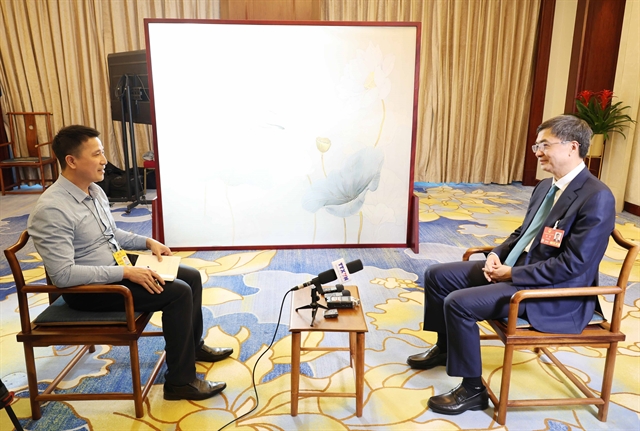 Opinion
Opinion

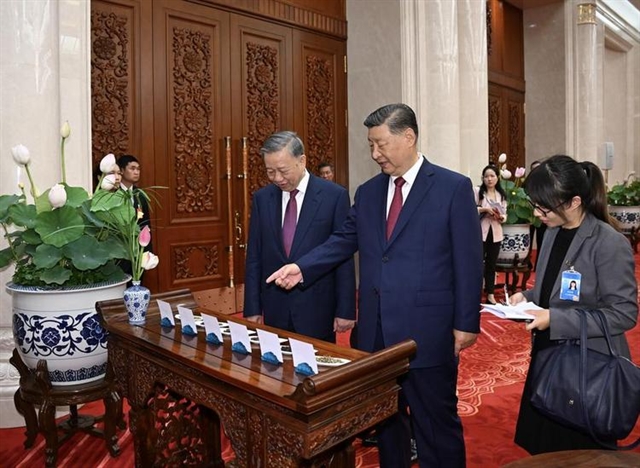 |
| Xi Jinping, general secretary of the Communist Party of China Central Committee and Chinese president, and Tô Lâm, general secretary of the Communist Party of Vietnam Central Committee and then Vietnamese president, who is on a state visit to China, have a small chat over tea in Beijing, capital of China, Aug. 19, 2024. — Xinhua/Xie Huanchi) |
When Tô Lâm made his first visit to China as Vietnam's top leader in August last year, he started the trip not in Beijing but in the southern metropolis of Guangzhou – a special arrangement Chinese President Xi Jinping later hailed as "quite meaningful."
It was in Guangzhou, a century earlier, that Hồ Chí Minh, the late Vietnamese leader, began his revolutionary activities in China, a period of history Xi described as "a shared red memory" between the two countries' ruling parties.
Xi will soon travel to Vietnam for a fourth state visit as general secretary of the Communist Party of China (CPC) Central Committee and Chinese president. The trip coincides with the 75th anniversary of diplomatic ties between China and Vietnam, two socialist neighbors that have forged an enduring bond as "comrades and brothers."
Behind the metaphors lies more than a diplomatic formality. Xi sees the enduring China-Vietnam friendship as a living cause to be carried forward. His upcoming visit offers a moment to draw inspiration from the storied past to chart the future course of bilateral relations.
"UNCLE HO"
During a state visit to Vietnam in 2017, Xi brought along a special national gift – 19 issues of The People's Daily, the official newspaper of the CPC Central Committee.
Among the newspapers were 16 yellowed copies carrying news reports on Hồ Chí Minh. "These newspapers date back to Chairman Hồ's visit to China in 1955. It took us quite some effort to find them," Xi explained.
One notable edition, dated June 26, 1955, featured a full-column front-page photograph of Hồ alongside Mao Zedong, Zhou Enlai and other first-generation CPC leaders.
Hồ, who founded the Communist Party of Vietnam (CPV) in Hong Kong and led Vietnam's liberation, forged close personal ties with CPC leaders during his 12 years of revolutionary activities in China. "He was like a brother for Chairman Mao Zedong, Premier Zhou Enlai and other Chinese leaders," Xi wrote in a signed article published by the major Vietnamese newspaper Nhân Dân (People) ahead of the 2017 visit.
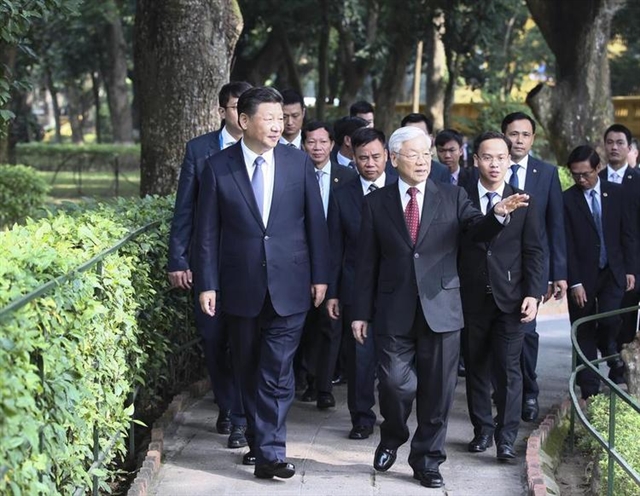 |
| Xi Jinping (L, front) talks with then General Secretary of the Communist Party of Vietnam (CPV) Central Committee Nguyen Phu Trong (R, front) at the former residence of late Vietnamese leader Ho Chi Minh in Hanoi, Vietnam, Nov. 13, 2017. — Xinhua/Lan Hongguang |
Xi holds dear the indelible contributions these great forerunners made to fostering the China-Vietnam friendship. During his first state visit to Vietnam in 2015, in a speech to Vietnam's National Assembly, Xi quoted Ho's own words: "China and Vietnam enjoy comradely and brotherly friendship."
Xi once shared his personal regard for Chairman Hồ while speaking with Vietnamese youth. "We call him 'Uncle Hồ'," Xi said. He noted that in the hearts of the Chinese people of his generation, Chairman Hồ is remembered as the best friend of the Chinese people.
Back in 2011, Xi, then Chinese vice president, visited Hồ's former residence to learn more about his life. Before his departure, Xi left an inscription: "The great man's spirit shall be honored for millennia, and the China-Vietnam friendship shall endure through the ages."
Six years later, during the 2017 state visit, Xi once again toured Chairman Hồ's former residence. At a pond near the Ban Sao Nak, the wooden house where Hồ once lived and worked, Xi learned to clap his hands before feeding fish, the same practice Hồ once used to draw fish closer.
While there, reflecting on bilateral ties, Xi said, "We should learn from Chairman Mao, Premier Zhou and Chairman Hồ, and carry forward and develop China-Vietnam friendship for the benefit of both our peoples."
TEA CHATS
During Tô Lâm's 2024 China tour, Xi prepared a tea gathering for him at the Great Hall of People in Beijing. The Vietnamese leader chose China as his first overseas destination only two weeks after being confirmed as general secretary of the CPV Central Committee. An editorial from Nhan Dan (People) highlighted the value both countries place on their traditional friendship.
Peng Liyuan, Xi's wife, also invited Tô Lâm's wife, Ngô Phương Ly, to a tea gathering, where they enjoyed traditional Chinese performances, including Chinese Opera.
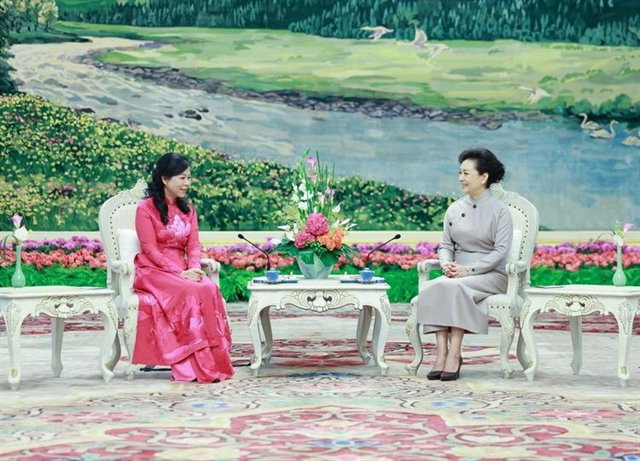 |
| Peng Liyuan, wife of Xi Jinping, chats over tea with Ngô Phương Ly, wife of Tô Lâm, at the Great Hall of the People in Beijing, capital of China, Aug. 19, 2024. (Xinhua/Wang Ye) |
Over the years, tea chats have evolved into a routine yet distinctive tradition during mutual visits between Chinese and Vietnamese leaders, given the two countries' similar tea cultures. "Unlike formal talks, tea talks offer a more intimate and personal form of communication for both leaders," said Pan Jin'e, director of the Department of International Communist Movement, Chinese Academy of Social Sciences.
Gift-giving during tea chats has created lasting memories in bilateral interaction. During Xi's state visit to Vietnam in 2023, then Vietnamese leader Nguyễn Phú Trọng, in a tea gathering with Xi in Hanoi, presented him with a gift: a painting that depicts a previous tea chat they shared in Beijing. "It might not be particularly remarkable, but the true value lies in the cherished brotherly friendship," Trọng told Xi.
Back in 2017, after a tea talk in Beijing, Xi presented Trọng with a replica of Chairman Hồ's handwritten poem in Chinese entitled "Walking." The poem is about Hồ's arduous yet determined quest for his nation's liberation. Xi also quoted the poem in his speech to Vietnam's National Assembly in 2015 to encourage both sides to take a far-sighted view for bilateral ties.
China and Vietnam are both socialist countries led by communist parties with similar political systems and development paths. Xi once said: "China and Vietnam have achieved what we have today because we have insisted on reform, opening up and innovation, and because we have found a development path that meets our own national conditions."
In this era of transformation and challenges, the two neighbors have decided to set their sights higher. During Xi's state visit to Vietnam in 2023, they pledged to build a China-Vietnam community with a shared future that carries strategic significance. Xi told Trong at the end of this trip, "we should walk along this path together."
YOUNG FRONTRUNNERS
Also during Xi's 2023 state visit, Trọng arranged a special meeting in Hanoi for the Chinese leader. The event brought together young Chinese and Vietnamese representatives, as well as individuals who had contributed to building the friendship between the two countries.
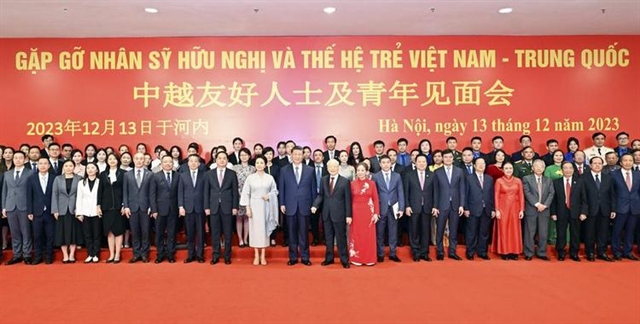 |
| Xi Jinping, Nguyễn Phú Trong and their spouses pose for group photos with representatives of young Chinese and Vietnamese and people who have contributed to the China-Vietnam friendship in Hanoi, Vietnam, Dec. 13, 2023. (Xinhua/Yin Bogu) |
Xi encouraged the attendees, particularly young people, to "take the lead" in promoting bilateral friendship as "frontrunners." It was during this occasion that Lê Nguyệt Quỳnh, a Vietnamese student, met Xi for the first time.
Quỳnh is now a 19-year-old freshman majoring in economics at Tsinghua University, Xi's alma mater. She described her impression of Xi: "He is kind, tall and dignified."
Representing Vietnamese youth, Quynh gave a speech in front of Xi at the event. A picture of that moment has now become the cover image of her profile on WeChat, China's most popular all-in-one messaging app.
"Every time a classmate added me on WeChat and saw that I had met Xi Dada, they were all curious about how it happened," Quynh said. The affectionate term Dada refers to uncle in Chinese dialects, and was given to Xi by Chinese netizens. "It was a marvelous experience, indeed," she said.
Quỳnh, whose hometown is Vietnam's Nghe An province, the birthplace of Hồ Chí Minh, started learning Chinese in junior high. After stumbling upon a video report of Xi's visit to his alma mater, she set her sights on attending Tsinghua University, her dream school.
Like Quỳnh, many Vietnamese students have chosen to pursue higher education in China. Around 20,000 Vietnamese students studied in China during the 2023-2024 academic year. The number of Chinese students in Vietnam is also on the rise.
Xi's belief that amity between nations lies in the affinity between their peoples really strikes a chord with Quỳnh. "No matter where you go, if people from two countries can get along well, they'll naturally start sharing elements of their own cultures with each other," she said. "And that's how friendships grow and last."
"And when it comes to maintaining the friendship between our two nations," Quỳnh said, "it's indeed us the youth who should carry that responsibility forward." — XINHUA




